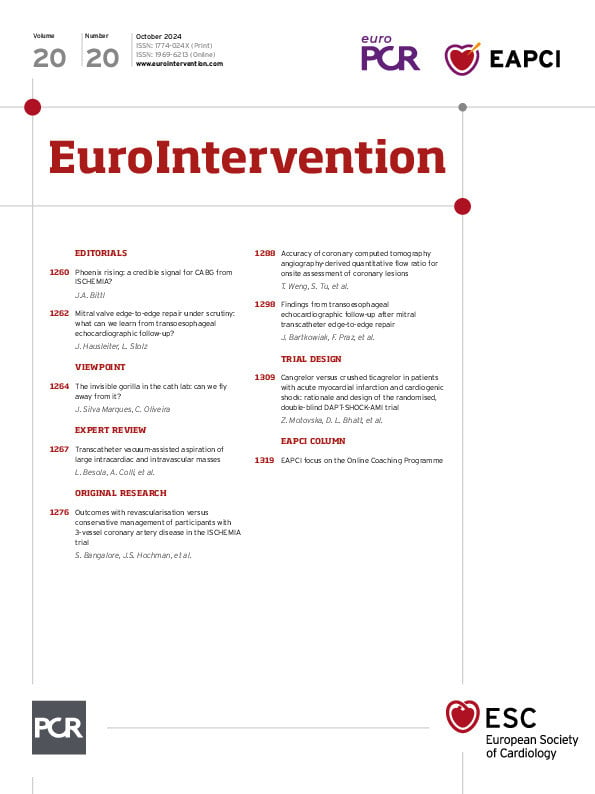When the writing committee (WC) for the U.S. coronary revascularisation guideline downgraded the recommendation for using coronary artery bypass graft (CABG) surgery to improve survival in patients with multivessel chronic coronary disease (CCD) from Class 1 (“should be done”) in 20111 to Class 2b (“may be reasonable”) in 20212 and placed it on par with the other 2b recommendation (“is uncertain”) for percutaneous coronary intervention (PCI)2, surgeons cried foul3. The original CABG recommendation1 was based on older studies and a meta-analysis from 19944, which suggested that study subjects with three-vessel coronary artery disease had better survival 5 years after CABG than they would have had if they had received medical therapy (MT) alone. The 2011 WC knew that MT in the older trials consisted of aspirin in 26% and beta blockers in 66% of subjects4 but rationalised that it was based on the best evidence at the time. As evidence grew and the concept of guideline-directed medical therapy (GDMT) emerged, the 2021 WC concluded that MT in older studies amounted to almost nothing. When ISCHEMIA (International Study of Comparative Health Effectiveness With Medical and Invasive Approaches) was published, which set a standard for GDMT by using antiplatelet or anticoagulant agents in 100%, statins in 95% and renal angiotensin system-acting agents in 69% of trial participants, and reported that participants with multivessel CCD randomised to an initial invasive (INV) strategy involving revascularisation (REV) if feasible had no survival advantage at 4 years over those randomised to an initial conservative (CON) strategy of GDMT alone5, the 2021 WC recognised the benefits of GDMT and downgraded the CABG recommendation2. But, as critics aptly pointed out3, no trial is perfect.
In a report in this issue of EuroIntervention6, Bangalore and colleagues tackle some of the concerns3 about ISCHEMIA. To address the role of baseline risk, the authors found that subjects with three-vessel CCD in the present analysis6 had higher all-cause mortality rates at 4 years in all randomisation groups (REV 7.6% vs CON 8.8%, absolute difference −1.2 percentage points [95% credible interval: −4.7 to 2.2]) than did the participants in the main trial with multivessel CCD (INV 6.5% vs CON 6.4%, 0.1 percentage points [−1.5 to 1.8])5.
In response to concerns about lumping the strategies of CABG and PCI together3, the authors6 reported outcomes by REV mode and found that CABG conferred a numerically greater benefit on mortality at 4 years (CABG 7.2% vs CON 8.8%, −1.7 percentage points [−5.6 to 2.6]) than did PCI (PCI 7.9% vs CON 8.8%, −0.9 percentage points [−5.4 to 3.4]). Consistent with this, the investigators6 found a 63% posterior probability that CABG reduced mortality by at least 1 percentage point and a 27% probability that it reduced mortality by at least 3 percentage points. In comparison, there was a 49% probability that PCI reduced mortality by at least 1 percentage point and a 16% probability that it reduced mortality by at least 3 percentage points.
To identify other clinical benefits, the investigators6 found that PCI conferred a plausible reduction (−5.8 percentage points [−0.5 to −10.8]) in cardiovascular (CV) death or myocardial infarction (MI) at 4 years, as compared with CON. This corresponded to a 96% posterior probability of a 1 percentage point reduction and an 86% probability of a 3 percentage point reduction.
Because event curves post-CABG did not begin to separate until 2.5 years and the early hazard of surgery was not completely offset by later benefits, the net effect post-CABG was a non-significant reduction (−3.7 percentage points [−8.8 to 1.5]) in CV death/MI at 4 years. This corresponded to an 85% posterior probability that CABG reduced CV death/MI by 1 percentage point and a 61% probability that surgery reduced it by at least 3 percentage points. However, CABG conferred a plausible reduction (−9.8 percentage points [−13.9 to −5.6]) in CV death or spontaneous MI at 4 years.
Bangalore and colleagues should be commended for their important analysis6, which identified lower rates of CV death/MI after REV than after CON in a cohort with three-vessel CCD and confirmed that 4 years is too early to expect a survival advantage. Because the ISCHEMIA protocol idealised clinical practice and employed a Heart Team approach to make REV decisions, future studies could make vital inferences. If survival curves continue to diverge and future studies establish that subjects in ISCHEMIA who were originally randomised to INV and chose CABG had higher baseline risk but experienced lower all-cause mortality than those who chose PCI or GDMT during 5 to 10 years of follow-up, evidence for a survival advantage of surgery for three-vessel CCD could emerge, and the CABG phoenix might be able to rise again from the ashes.
Conflict of interest statement
The author has no conflicts of interest to declare.

